EMBASSY OF JAPAN DONATES TB MOBILE CLINIC TO LIMPOPO PROVINCE
2018/5/21
Limpopo’s residents and its approximately 80,000 former mine workers now have access to a Tuberculosis (TB) and HIV Mobile Clinic, thanks to the Embassy of Japan’s Grant Assistance for Grass-roots Human Security Projects (GGP) scheme.
The handover of the mobile clinic took place at the Mashupje High School on 21 May 2018 and was attended by the Honourable Minister Maite Nkoana-Mashabane and several members of the African National Congress Women's League. Mashupje High School is where Minister Mashabane used to teach English to students for many years.
The Ambassador of Japan to the Republic of South Africa, Shigeyuki Hiroki, who handed the mobile clinic over to the Aurum Institute in Limpopo, said the GGP began its work in South Africa in 1990 by providing support to educational, medical and non-government organisations.
“To date, over 600 GGP projects worth almost R438 million have been implemented throughout the country to help address educational, health services, vocational training and other basic human needs at grassroots level. Some 20 projects have been launched in Limpopo alone between 2007 and 2016, with 14 of these being the construction of school facilities,” he says.
Ambassador of Japan H.E. Shigeyuki Hiroki at the handover ceremony
The handover of the mobile clinic took place at the Mashupje High School on 21 May 2018 and was attended by the Honourable Minister Maite Nkoana-Mashabane and several members of the African National Congress Women's League. Mashupje High School is where Minister Mashabane used to teach English to students for many years.
The Ambassador of Japan to the Republic of South Africa, Shigeyuki Hiroki, who handed the mobile clinic over to the Aurum Institute in Limpopo, said the GGP began its work in South Africa in 1990 by providing support to educational, medical and non-government organisations.
“To date, over 600 GGP projects worth almost R438 million have been implemented throughout the country to help address educational, health services, vocational training and other basic human needs at grassroots level. Some 20 projects have been launched in Limpopo alone between 2007 and 2016, with 14 of these being the construction of school facilities,” he says.

Ambassador of Japan H.E. Shigeyuki Hiroki at the handover ceremony
The Aurum Institute, which is going to provide mobile clinic service, is a South African public-benefit organisation with more than 20 years' experience in leading the response, treatment and research efforts to eradicate TB and HIV.
The mobile clinic, which will offer complimentary TB screening and HIV testing to Limpopo residents, is equipped with the latest in healthcare innovations with a value of R3 million. It includes an integrated chest x-ray machine, which was provided by Japanese firm, Fuji-Film.

The mobile clinic, which will offer complimentary TB screening and HIV testing to Limpopo residents, is equipped with the latest in healthcare innovations with a value of R3 million. It includes an integrated chest x-ray machine, which was provided by Japanese firm, Fuji-Film.
A spokesperson from the Embassy of Japan, Kota Toba, said the mobile clinic will move to different rural communities in Limpopo to service individuals suffering from TB and HIV. “Local residents will have access to state of the art testing and treatment facilities in the comfort of their own neighbourhood and won’t have to travel long distances for basic services.”
“According to Statistics South Africa (Stats SA), South Africa has one of the highest incidences of TB globally. The World Health Organisation (WHO) estimated that there were about 454,000 cases of active TB in 2015, which is 0.8% of the population. In addition, HIV and tuberculosis (TB) are so closely connected that their relationship is often described as a co-epidemic. In fact, of the 454,000 TB incident cases in South Africa in 2015, WHO estimates that about 57% (258,000) of these are HIV positive. Given such strong link between the two diseases, we believe that innovations such as the mobile clinic will help SA communities in the fight against not only TB, but HIV as well,” Toba added.
“According to Statistics South Africa (Stats SA), South Africa has one of the highest incidences of TB globally. The World Health Organisation (WHO) estimated that there were about 454,000 cases of active TB in 2015, which is 0.8% of the population. In addition, HIV and tuberculosis (TB) are so closely connected that their relationship is often described as a co-epidemic. In fact, of the 454,000 TB incident cases in South Africa in 2015, WHO estimates that about 57% (258,000) of these are HIV positive. Given such strong link between the two diseases, we believe that innovations such as the mobile clinic will help SA communities in the fight against not only TB, but HIV as well,” Toba added.


The handover ceremony was well attended by over 500 guests Ambassador Hiroki, Minister H.E. Maite Nkoana-Mashabane with
and members of the community local residents inside the donated mobile clinic
and members of the community local residents inside the donated mobile clinic
The Embassy of Japan has gained recognition for its work in the South African healthcare sector. In 2014, the embassy launched the procurement of a mobile mammography clinic in collaboration with Pink Drive. In addition, the embassy donated cataract eye surgery equipment to the Vredendal Hospital in the Western Cape in 2014.
The embassy also has a strong presence in Limpopo’s education sector where it has spearheaded several projects, including the construction of the Nokomeetse Primary School in Schoonoord (2013); Scheiding Primary School in Lepelle-Nkumpi (2014); Mosepedi Secondary School in Lepelle-Nlumpi (2014); and Nkgele Primary School in Moletjie (2016).
“By delivering innovations such as the TB and HIV Mobile Clinic where they are most needed, we can assist individuals living in rural areas with the treatment they deserve to live long and prosperous lives,” concluded Toba.

The embassy also has a strong presence in Limpopo’s education sector where it has spearheaded several projects, including the construction of the Nokomeetse Primary School in Schoonoord (2013); Scheiding Primary School in Lepelle-Nkumpi (2014); Mosepedi Secondary School in Lepelle-Nlumpi (2014); and Nkgele Primary School in Moletjie (2016).
“By delivering innovations such as the TB and HIV Mobile Clinic where they are most needed, we can assist individuals living in rural areas with the treatment they deserve to live long and prosperous lives,” concluded Toba.

Local residents show their joy and gratitude
